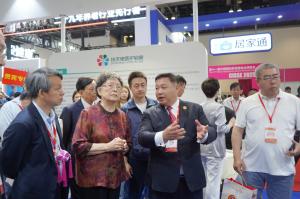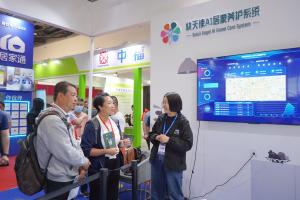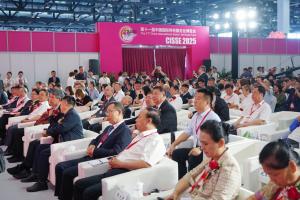China’s Version of Inspiren: Non-Intrusive, Wear-Free, Proactive Care for Aging at Home
“We are proud to introduce the three major innovations of our newly released Quick Angel AI Home Care System 1.0: First, it has fully realized ‘wear-free, non-intrusive’ contactless health monitoring. Second, it has established a closed loop for home health monitoring that includes both monitoring and proactive care. Third, it has launched an open, integrated platform supported by artificial intelligence, integrating home-based elderly care services into a holistic home care ecosystem,” said Dr. Zhang Lijun, Chairman of V1 Group and Founder of Quick Angel Home in Care Company.
Technological Breakthrough: Millimeter-Wave Radar + AI Algorithms, Redefining Home Safety Monitoring
The biggest highlight of the “Quick Angel AI Home Care System” is its core technology—millimeter-wave radar radio frequency imaging. Through contactless monitoring, the system can accurately identify behaviors such as elderly falls, abnormal bed exits, and nighttime activities, and issue real-time alerts. For instance, if an elderly person slips in the bathroom, the system can quickly determine the abnormal posture through its algorithms and immediately notify emergency contacts and the medical care platform.
Unlike the way before, which relies on wearable devices or cameras, this system adopts a “wear-free” design, avoiding the intrusiveness of traditional devices and addressing privacy concerns. The millimeter-wave radar technology is immune to light and moisture interference, covering private spaces like bedrooms and bathrooms. It can even analyze health data such as sleep quality and toilet frequency, providing a basis for personalized care.
Service Model: From “Passive Response” to “Proactive Intervention” the Core advantages:
The “Quick Angel Home Care isystem not only provides safety monitoring but also constructs a closed-loop ecosystem of “monitoring - alerting - service,” changing the previous state of “monitoring without response”:
1. Smart Alerting: In case of emergencies like falls or abnormal heart rates, the system directly links to an AI-driven monitoring platform, which analyzes the situation and triggers the Quick Angel medical emergency care system.
2. Medical Care at Home: Leveraging the national nurse network of “Quick Angel home in care the system offers rapid response, including home visits for inspection and accompaniment to medical appointments, as well as over 50 professional services such as dressing changes, catheterization, and postoperative care, all within a 2-hour response time.
3. Health Management: By analyzing long-term health data through AI algorithms, the system generates anti-aging plans, such as customized antioxidant diet plans and sleep optimization suggestions, echoing Dr. Zhang Lijun’s concept of “graceful aging.”
This model breaks through the passivity of traditional home-based elderly care.
Comparison with Inspiren: Localized Innovation and Ecosystem Integration
Although Inspiren excels in technological integration in the United States, the “Quick Angel” system is more characterized by Chinese features:
• Privacy-Centric Design: While Inspiren relies on cameras and wearable devices, “Quick Angel” uses millimeter-wave radar for contactless monitoring, which better meets the privacy-sensitive needs of Chinese families.
• Deep Integration of Medical Resources: By collaborating with top medical institutions to form a “medical care think tank,” the system ensures the professionalism of its services.
• Aging-Friendly Scenario Expansion: The system not only provides safety monitoring but also integrates modules for domestic services and rehabilitation care, covering the entire chain of “medical care, nursing, living, and transportation.”
Social Value: Solving the Three Major Pain Points of Home-Based Elderly Care
1. Safety Challenges: In China, over 40 million elderly people fall each year, with half of these incidents occurring at home. The “Quick Angel ”system can reduce emergency response time to the minute level.
2. Labor Shortage: By using AI to replace some manual inspections, the system alleviates the shortage of caregivers, especially benefiting those who live alone.
3. Cost Optimization: The hardware cost of the system is 50% lower than that of imported products, and it supports an “on-demand procurement” model to avoid inventory accumulation in institutions.
Future Outlook: Comprehensive Upgrades from Technology to Ecosystem
It is revealed that V1 Group is collaborating with leading hardware and terminal manufacturers to develop intelligent elderly care robots that integrate fall alerts, health monitoring, and emotional interaction, with a focus on enabling them to provide on-site response capabilities and further expanding service scenarios. Additionally, the system plans to connect with community elderly care stations and domestic service platforms to build a “15-minute home care circle,” with the goal of covering more than 80% of cities in China by 2030.
Conclusion
Under the “9073” elderly care model, the “Quick Angel AI Home Care System” has redefined the boundaries of home-based elderly care through technology. It is not only China’s version of Inspiren but also a “wear-free, response-focused” revolution—hiding technology in daily life and ensuring protection is always present. As Dr. Zhang Lijun said, “The essence of graceful aging is to make technology a warm companion, not a cold tool.”
Qian Liu
V1 Intelligent Machine Technology Co., Ltd.
Liuqian@v1.cn
Legal Disclaimer:
EIN Presswire provides this news content "as is" without warranty of any kind. We do not accept any responsibility or liability for the accuracy, content, images, videos, licenses, completeness, legality, or reliability of the information contained in this article. If you have any complaints or copyright issues related to this article, kindly contact the author above.
Digital Guider Take on Google Ads’ AI Max Rollout and Its Impact
Injury Law Partners Launches Free Case Evaluations for Construction Accident Victims in Philadelphia
CallMyDoctor Launches 24/7 Doctor At Home Dubai Service with DHA-Certified Doctors
Kalendarium
Więcej ważnych informacji
 Jedynka Newserii
Jedynka Newserii

 Jedynka Newserii
Jedynka Newserii

Ochrona środowiska

Z powodu braku przejrzystego prawa branża recyklingu odkłada inwestycje. Firmy apelują o szybkie wdrożenie przepisów
Branża recyklingu stoi przed wyzwaniami związanymi z wdrożeniem systemu kaucyjnego, systemu rozszerzonej odpowiedzialności producenta i rozporządzenia PPWR. Brakuje jednak odpowiednich przepisów dostosowujących polskie prawo i realia do unijnych regulacji. W efekcie utrzymującej się niepewności prawnej między 2018 a 2023 rokiem co trzeci zakład recyklingu zamknął działalność. Wiele firm odkłada inwestycje, czekając na uregulowanie rynku. Podobna niepewność dotyczy też producentów opakowań.
Transport
Testowanie pojazdów zautomatyzowanych wkrótce będzie możliwe. To odpowiedź na postulaty przedsiębiorców

Kończą się prace nad przepisami, które mają usprawnić prace badawcze nad pojazdami zautomatyzowanymi. Ma to być odpowiedź na postulaty przedsiębiorców, którzy wskazywali na potrzebę pilnej zmiany przepisów w zakresie testowania pojazdów autonomicznych. Obecne regulacje nie sprzyjają postępowi technologicznemu i rozwoju autonomiczności pojazdów, o czym świadczy bardzo niewielka liczba wydanych uprawnień do ich prowadzenia.
Firma
Przedsiębiorcom coraz bardziej doskwiera niestabilność i skomplikowanie przepisów podatkowych. Problemem są też niejasne ich interpretacje

Polscy przedsiębiorcy często negatywnie oceniają jakość przepisów podatkowych – wynika z raportu „Przedsiębiorcy pod lupą fiskusa 2025” przygotowanego przez firmę doradztwa podatkowego MDDP we współpracy z Konfederacją Lewiatan. Ich niepokój budzą niejednolite interpretacje przepisów i niepewność prawa podatkowego, które cały czas jest modyfikowane. Wśród kluczowych zmian w obszarze podatków, które będą dotyczyć praktycznie wszystkich przedsiębiorców, są m.in. wprowadzenie Krajowego Systemu e-Faktur czy zmiany w podatku od nieruchomości.
Partner serwisu
Szkolenia

Akademia Newserii
Akademia Newserii to projekt, w ramach którego najlepsi polscy dziennikarze biznesowi, giełdowi oraz lifestylowi, a także szkoleniowcy z wieloletnim doświadczeniem dzielą się swoją wiedzą nt. pracy z mediami.











.gif)

 |
| |
| |
|